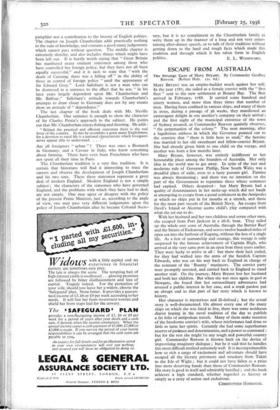ESCAPE FROM AUSTRALIA
The Strange Case of Mary Bryant. By Commander Geoffrey Rawson. (Robert Hale. I2S. 6d.)
MARY BRYANT was an empire-builder much against her will. In the year 1787, she sailed as a female convict with the " first fleet " sent to the new settlement at Botany Bay. The fleet arrived in February, 1788. It carried some hundred and ninety women, and more than three times that number of men. Having been confined in various ships, and many of them in irons, during a passage of 36 weeks, they manifested an extravagant delight in one another's company on their arrival ; and the first night of the municipal existence of the town of Sydney assured, as Commander Rawson quaintly observes, " the perpetuation of the colony." The next morning, after a lugubrious address in which the Governor pointed out to the convicts that " there is little here to steal," the heroine was married to her old sweetheart and fellow-convict Bryant. She had already given birth to one child on the voyage, and another was born a few months later.
Mary Bryant, however, was entirely indifferent to her honourable place among the founders of Australia. Her only idea in the world was to get away. In spite of the just and moderate rule of Governor Phillip, New South Wales was a dreadful place of exile, even to a lusty peasant girl. Famine was always threatening ; and there was no intention on the part of the Government to repatriate those whose sentences had expired. Others despaired : but Mary Bryant had a quality of determination in her make-up which did not baulk at attempting to escape from a penal settlement in the Antipodes at which no ships put in for months at a stretch, and those for the most part vessels of the British Navy. An escape from Devil's Island or Alcatraz seems child's play compared with what she set out to do.
With her husband and her two children and seven other men, she escaped from Port Jackson in a 26-ft. boat. They sailed up the whole east coast of Australia, through the Barrier Reef and the Straits of Endeavour, and across twelve hundred miles of open sea into the harbour of Kupang, without the loss of a single life. As a feat of seamanship and courage, this voyage is only surpassed by the famous achievement of Captain Bligh, who arrived at the very same port in an open boat three years earlier. They were lucky to arrive at all : but there their luck ended, for they had walked into the arms of the fiendish Captain Edwards, who was on his way back to England in charge of the remnant of the ' Bounty ' mutineers. The convict party were promptly arrested, and carried back to England to stand another trial. On the journey, Mary Bryant lost her husband and both her children. But when she was once again in gaol at Newgate, she found that her extraordinary adventures had aroused a public interest in her case, and a royal pardon put an abrupt end to that part of her story which is known to history.
Her character is mysterious and ill-defined ; but the actual story is well-documented. On almost every one of the many ships on which she was fated to live, there was some assiduous diarist hoping in the naval tradition of the day to publish a fat folio of antipodean travels. Many of them make mention of the handsome convict's wife, whose misfortunes had done so little to tame her spirits. Certainly she had some superhuman reserve of patience and determination, and a power to command : but for the rest she might be any tough and powerful country girl. Commander Rawson is thrown back on the device of improvising imaginary dialogue ; but be it said that he handles this most difficult method extremely well. It is incomprehensible how so rich a cargo of excitement and adventure should have escaped all the literary privdteers and wreckers from Tahiti to the Isle of Wight ; but it could not have fallen as a prize into more deserving hands than those of Commander Rawson. His story is good in itself and admirably handled ; and the book achieves a high standard, whether regarded as history or simply as a story of action and endeavour.
CHRISTOPHER HOBHOUSE.
















































 Previous page
Previous page